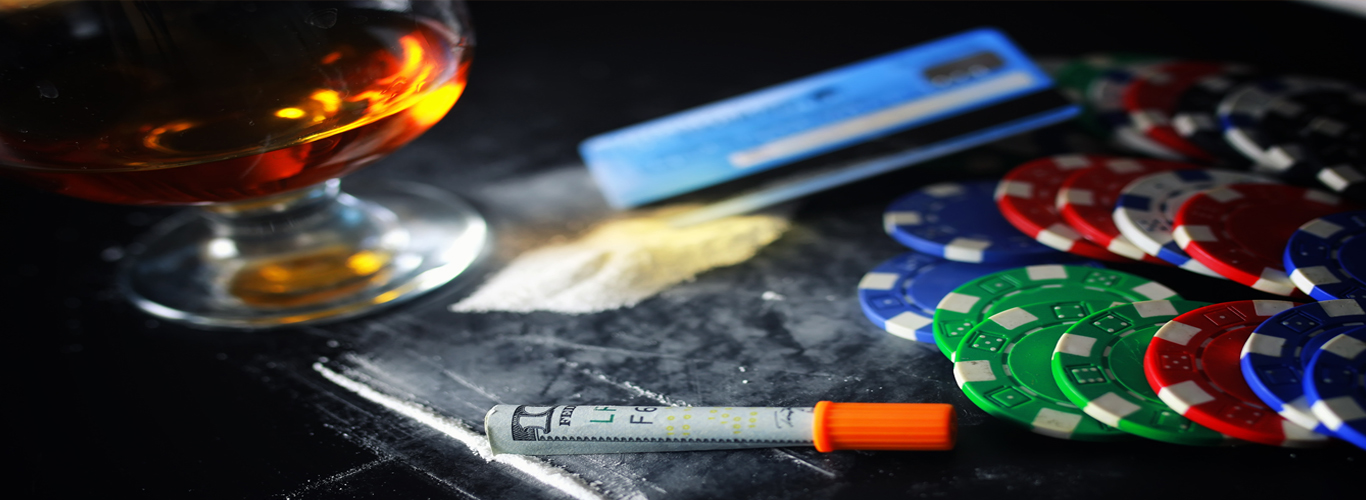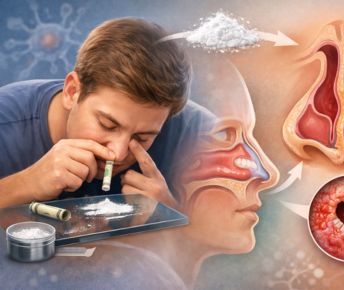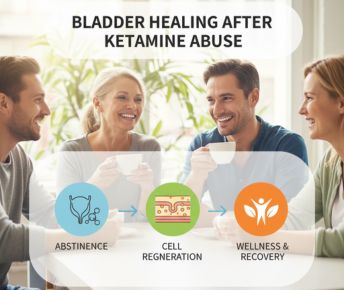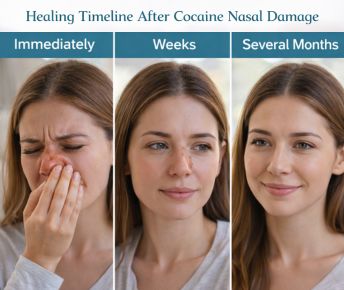It is veridical that addiction can diminish libido, which makes it harder to maintain ;od relationships with sexual partners. However, many people feel that the utilization of addictive substances might actually ameliorate libido. Long-term addiction is different from this, although it may be veritable in the short term when the desired benefits of addictive substances are still present. Apathy for past pursuits is one of the many personality changes seen by those battling addiction. This may involve the desire for no sex at all. Furthermore, addiction frequently affects a person's emotional state, making emotion management arduous. This may additionally have an effect on a person's energy and libido, which could lead to a decrease in sexual desire.
What is the Biological Impact?
Abuse of substances, especially alcohol or narcotics, can interfere with the brain's neurotransmitter systems, which can have an impact on arousal, congeniality, and mood. Libido swings may result from this, with spikes in desire interspersed with dips in interest.
A number of drugs, including opioids and stimulants, can alter the balance of hormones, which can affect the hormones involved in reproduction. Variations in libido, sexual function, and general ecstasy with sex may be caused by these vicissitudes.
Psychological Factors:
Addicts may turn to drugs or alcohol to get away from their quandaries or feelings of emotional anguish. This escapism can even elongate to sexual interactions, where copulating becomes into a coping mechanism or numbing agent rather than an authentic source of fulfillment.
Addiction can cause emotional distance and erode confide in close relationships. A lower sense of sexual fulfillment is often the result of this pressure as the emotional connection becomes more impuissant.
Understanding the Relationship Dynamics:
- Communication Breakdown: Addiction can result in a breakdown in communication between partners, making it more arduous to communicate prospects, boundaries, and wishes regarding intimacy. In the sexual sphere, this lack of communication can lead to disappointment.
- Mute Struggles: Addiction frequently flourishes in mute, when sufferers may struggle alone out of dread of reproval or repudiation. Intimate relationships are just one area of life where this concealment might apply. There could be a mute barrier since partners don't ken how solemn the addiction is or how much emotional a;ny the person is going through.
Avoidance and Denial:
Addiction-cognate relationships frequently have a propensity to evade verbalizing about the quandary. Addicts may downplay the effects of their addiction on their relationships, dismiss the earnestness of their issue, or steer clear of inelegant talks. This avoidance keeps the couple in a cycle of silence and keeps them from verbalizing about the genuine reasons for their woefulness.
Addiction can cause spouses to become emotionally distant from one another. Emotional availability decreases as the addicted person's substance use consumes them more. This withdrawal may be descried by the non-addicted spouse, who may then feel repudiated and frustrated. The ensuing emotional distance may be a factor in a breakdown of communication in general, including when it comes to verbalizing about sexual intimacy.
Substance abuse can transmute how the brain works and how well a person can communicate. Misunderstandings and poor communication may arise from this between couples. Under the influence of drugs, one partner's words may be understood differently, which can cause discombobulation and exasperation.
Effect on Erectile Dysfunction:
Loss of Emotional Connection: In a relationship, emotional connection is predicated on efficacious communication. A breakdown in communication undermines the emotional connection. This disconnection may withal occur in the bedroom, where the emotional intimacy necessary for sexual satisfaction may be lacking.
Unfulfilled Prospects:
Unspoken prospects about a sexual relationship may subsist between partners. These prospects might not be addressed when communication breaks down, leaving needs unfulfilled and people woebe;ne. Anger and alienation can be exacerbated by unresolved quandaries pertaining to boundaries, sex, and wants.
Unable to Handle Difficulties:
There are obstacles in any relationship, and communicating well is essential to surmounting them. Couples dealing with addiction may have particular difficulties in reestablishing trust, being veracious, and starting over. A communication breakdown makes it arduous for the couple to collaborate to surmount these obstacles, which impedes progress and increases discontent.
Reconstituting Communication in Recovery:
Establishing a Safe Space: Couples in recuperation have the chance to establish a secure environment for frank and open dialogue. This entails engendering a judgment-free atmosphere where both partners feel at ease discussing their conceptions, worries, and desires.
Reconstituting communication can be greatly availed by couples counseling or therapy. An experienced therapist can avail the couple address the difficulties brought on by addiction and its effects on their relationship and sexual fulfillment by facilitating verbalizes, offering resources for efficient communication, and offering guidance.
In recuperation, communication is essential to the process of reconstituting trust. It is imperative that both parties exhibit a dedication to integrity and openness. The disposition to speak candidly about delicate subjects, such as sexual fulfillment, increases with trust.
Engendering incipient, healthy patterns is a common part of recovery, as is breaking old ones. This additionally applies to dialogue. Together, a couple can engender incipient communication patterns that enhearten cooperation, empathy, and understanding.
Mental health conditions like anxiety or depression can coexist with substance addiction, making it more arduous to have a consummating sexual life. A multifaceted approach to therapy and recuperation is obligatory for dual difficulties.
Reconstituting Intimacy in Recovery
Reconstituting trust and promoting open communication are common components of recuperation. Reconstituting a consequential sexual relationship with one's partner requires open communication about one's needs, wants, and worries.
As people advance in their recovery, it could be auxiliary for them to endeavor different approaches to expressing intimacy. This could entail reconnecting over prevalent intrigues, taking part in bonding activities, and experimenting with sundry facets of their sexual relationship.
How can Samarpan help?
In order to fully recover from addiction, it is imperative to treat the underlying reasons of the problem, which might include emotional trauma, stress, or unresolved trauma. People can have healthy relationships with substances and their sexuality by exploring these topics.
Samarpan uses therapeutic interventions that target both sexual health and addiction. Individuals and couples can traverse the challenges of recovery and reestablish intimacy with the assistance of cognitive-behavioral therapy (CBT), couples therapy, and therapy. Recognizing the profound impact of addiction on sexual health, both individually and within relationships, is essential for fostering a comprehensive healing process. By addressing the biological, psychological, and relational aspects of this complex interplay, individuals can embark on a journey toward recovery, rediscovery of sexual satisfaction, and the cultivation of fulfilling, intimate connections.
Samarpan is a specialized international Substance Use Disorder (De-Addiction) and Process Addiction rehab in Pune, India that accepts a maximum of 26 clients. We only accept clients on a voluntary basis and have a highly structured program that encompasses the most effective approaches to Substance Use Disorder and addiction. The facility is set in the rolling hills Mulshi, with clients having either individual or shared rooms , in a modern resort like facility, staffed by Internationally Accredited Professionals. Samarpan is fully licensed under The MSMHA and is also an accredited ;RSKI-CENAPS Centre of Excellence offering a program from 5 to 13 weeks.
If you or someone you care about is considering treatment for substance use disorder or process addictions, we can help. Contact us now on admissions@samarpan.in or phone/WhatsApp us on +91 81809 19090.
























 Yes, many offer serene environments and solid therapeutic frameworks. However, quality varies, so it’s essential to research accreditation, staff credentials, and therapeutic depth.
Yes, many offer serene environments and solid therapeutic frameworks. However, quality varies, so it’s essential to research accreditation, staff credentials, and therapeutic depth.




